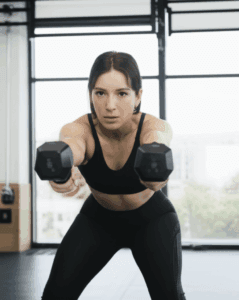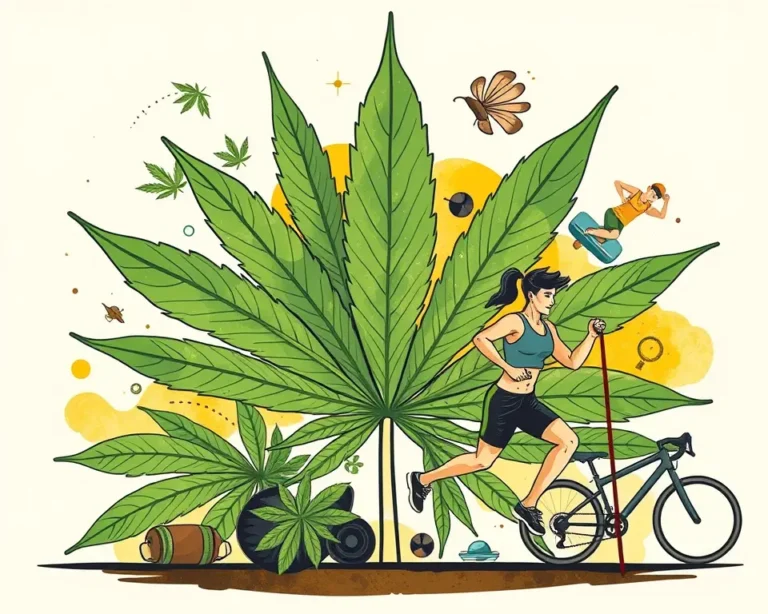The intersection of cannabis and fitness is a hot topic, sparking curiosity and debate among athletes and fitness enthusiasts alike. As societal attitudes toward cannabis evolve, more individuals are exploring its potential role in enhancing workouts, aiding recovery, and improving overall athletic performance. But does cannabis truly improve your workout, or is it just a lot of smoke? Let’s dive into the science, separate fact from fiction, and explore how cannabis might influence your fitness journey.
Cannabis and Athletic Performance: An Overview
Cannabis has been used for centuries, but its effects on athletic performance are still being studied. While some athletes swear by its benefits, scientific evidence remains limited and sometimes contradictory. It’s essential to understand the potential effects of cannabis, both positive and negative, before incorporating it into your fitness routine.
THC vs. CBD: Understanding the Key Players
Cannabis contains over 100 different chemical compounds called cannabinoids. The two most well-known are:
- THC (tetrahydrocannabinol): The primary psychoactive compound in cannabis, responsible for the “high” sensation. It can also have effects on pain perception, mood, and appetite.
- CBD (cannabidiol): A non-psychoactive compound with potential therapeutic benefits, such as reducing inflammation, anxiety, and pain.
How Cannabis Interacts with Your Body: The Endocannabinoid System
To understand how cannabis might affect your workout, it’s crucial to know about the endocannabinoid system (ECS). The ECS is a complex network of receptors and neurotransmitters that plays a vital role in regulating various bodily functions, including:
- Mood
- Pain perception
- Inflammation
- Immune response
- Sleep
- Memory
THC and CBD interact with the ECS, potentially influencing these functions and impacting athletic performance and recovery.
The Potential Benefits of Cannabis for Workouts
While more research is needed, some studies and anecdotal evidence suggest that cannabis may offer certain benefits for athletes:
Enhanced Enjoyment and Motivation
- Boosting mood: Studies have indicated that cannabis, including both THC and CBD, can increase positive mood and enjoyment during exercise.
- Tapping into the “runner’s high”: Some athletes report that cannabis helps them achieve a euphoric state similar to a “runner’s high” with less effort. Cannabis may enhance the exercise experience, making it more enjoyable and potentially motivating individuals to exercise more regularly.
Pain Management and Recovery
- Reducing pain and inflammation: THC and CBD have been linked to pain mitigation and reducing inflammation, which can be hallmarks of exercise recovery.
- Muscle relaxation: Cannabis may act as a natural muscle relaxant, promoting relaxation and reducing tension after strenuous workouts.
- Improving sleep: Cannabis, particularly CBD, may improve sleep quality, which is essential for muscle recovery and overall well-being.
Increased Focus and Mental Clarity
- Achieving a “flow state”: Some athletes claim that cannabis helps them focus and get into a “flow state,” where their attention is solely in the present moment.
- Reducing anxiety: The anxiolytic properties of cannabis may help athletes mitigate exercise-related anxiety and improve focus.
The Potential Drawbacks and Risks
Despite the potential benefits, it’s crucial to acknowledge the potential drawbacks and risks associated with cannabis use and exercise:
Impaired Performance
- Increased heart rate: THC can increase heart rate, making exercise feel more effortful.
- Impaired coordination and reaction time: THC can impair coordination, balance, and reaction time, which could negatively affect performance in activities requiring precision.
- Reduced physical work capacity: Some studies have shown that cannabis use can decrease physiological work capacity and reduce maximal exercise duration.
Health Risks
- Cardiovascular effects: Cannabis, particularly THC, can alter cardiovascular function, potentially increasing the strain on the heart.
- Pulmonary toxicity: Smoking cannabis can lead to bronchial irritation, chronic cough, and wheeze.
- Mental health risks: Marijuana use has been associated with increased mental health risks, including anxiety, paranoia, and psychosis, particularly with high THC levels.
Legal and Anti-Doping Considerations
- Prohibited substance: Cannabis is prohibited in-competition by many sports organizations, including the World Anti-Doping Agency (WADA).
- Risk of contamination: CBD products may contain THC, a banned substance, potentially leading to a positive drug test.
- Legal consequences: Athletes are responsible for adhering to state-to-state or international laws regarding controlled substances, as cannabis and cannabinoids remain illegal in many countries.
Research Insights: What the Studies Say
The scientific community continues to explore the effects of cannabis on athletic performance and recovery. Here’s a glimpse at some of the research findings:
- A study published in Sports Medicine (2024) found that cannabis before exercise seems to increase positive mood and enjoyment, whether using THC or CBD. However, THC products may make exercise feel more effortful.
- Research in the International Journal of Molecular Sciences suggests that cannabis contains numerous components, including over 60 compounds classified as cannabinoids, which may contribute to its effects on the body.
- A study in Gut Microbes (2021) found that exercise increases the body’s own cannabis-like substances (endocannabinoids), which in turn helps reduce inflammation and could potentially help treat certain conditions such as arthritis, cancer, and heart disease.
- A 2024 study demonstrated that the inhalation of cannabis containing THC alters physiological responses to both submaximal and maximal exercise and is associated with decreases in exercise performance, regardless of the method of inhalation.
- A survey study (2023) found that individuals use cannabis to assist with exercise recovery, pain relief resulting from muscle-soreness, to reduce inflammation, and enhance sleep.
Cannabis and Different Types of Exercise
The effects of cannabis may vary depending on the type of exercise:
- Endurance activities (running, cycling): Some athletes report that cannabis helps them focus, reduce soreness, and improve endurance during long runs or rides. However, THC may increase heart rate and make the activity feel more difficult.
- Strength training: Cannabis may help with pain management and muscle relaxation after weightlifting. However, THC could impair coordination and reaction time, potentially increasing the risk of injury.
- Low-impact activities (yoga, swimming): The euphoric state induced by cannabis may enhance enjoyment and relaxation during these activities, which don’t require a lot of fine motor control.
Responsible Cannabis Use for Athletes: A Guide
If you’re considering using cannabis as part of your fitness routine, here are some guidelines to follow:
- Consult with a healthcare professional: Talk to your doctor or a qualified healthcare provider to discuss the potential risks and benefits of cannabis use, especially if you have any underlying health conditions or are taking medications.
- Start with a low dose: Begin with microdosing and gradually increase until you find the sweet spot. Listen to your body and adjust accordingly.
- Choose the right product: Consider the THC and CBD content of the cannabis product. CBD may be a better option if you want to avoid the psychoactive effects of THC.
- Be mindful of the method of consumption: Smoking cannabis can have negative effects on lung health. Consider alternative methods, such as edibles, tinctures, or vaporizers.
- Avoid using cannabis before activities requiring precision: If your workout involves activities that require coordination, balance, or quick reaction times, avoid using THC-containing cannabis beforehand.
- Be aware of legal and anti-doping regulations: Understand the laws in your area and the anti-doping rules of your sport.
- Monitor your body’s response: Pay attention to how cannabis affects your performance, recovery, and overall well-being. Adjust your usage accordingly.
- Prioritize safety: Do not drive or operate heavy machinery while under the influence of cannabis.
Famous Athletes Who Use Cannabis
The stigma surrounding cannabis use in sports is gradually diminishing, with more athletes openly discussing their experiences. Some famous athletes who have used cannabis as part of their wellness regime include:
- Megan Rapinoe (soccer): Uses CBD for pain and inflammation, mood stabilization, and better sleep.
- Martellus Bennet (NFL): Estimates that close to 90% of NFL players smoke marijuana for pain relief.
- Floyd Landis (cycling): Uses cannabis for pain management.
- Bubba Watson (golf): Claims CBD has eased his aches and pains and helped extend his career.
- Al Harrington (NBA): An outspoken cannabis advocate.
- Ross Rebagliati (snowboarding): A cannabis advocate and entrepreneur.
The Future of Cannabis and Athletics
As research continues and attitudes evolve, the role of cannabis in sports and fitness is likely to become clearer. Future studies will need to address:
- The optimal dosages and ratios of THC and CBD for different athletic activities.
- The long-term effects of cannabis use on athletic performance and health.
- The impact of cannabis on specific physiological parameters, such as muscle protein synthesis and inflammation markers.
- The psychological effects of cannabis on motivation, focus, and pain perception in athletes.
Conclusion
The relationship between cannabis and athletic performance is complex and multifaceted. While some evidence suggests potential benefits, such as enhanced enjoyment, pain management, and improved focus, there are also potential drawbacks, including impaired performance and health risks. It’s crucial to approach cannabis use with caution, consult with a healthcare professional, and be mindful of legal and anti-doping regulations. As research progresses, we’ll gain a better understanding of how cannabis can be used responsibly and effectively to support athletes in their pursuit of optimal performance and well-being.







